New Board Games We’re Excited to Play: Fall 2020 Preview
All art courtesy of the respective publisher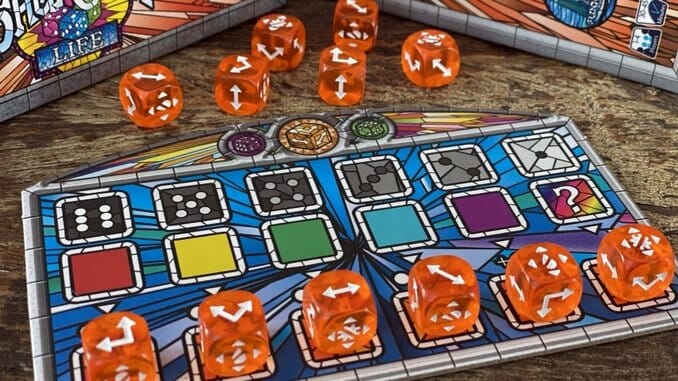
The cancellation of the live Gen Con this year was a huge blow to publishers who depend on the event to showcase new products, sell inventory, book pre-orders, and just generally build up interest in their wares. It also meant that folks like me didn’t get to visit with publishers and see or even demo new and upcoming releases, so I reached out to a number of publishers I would usually see in Indianapolis to talk about their release queue for the rest of 2020. Here’s what I learned from those conversations, along with available press releases or rulebooks on games we should see before the holidays. And it’s all broken down by publisher.
Floodgate
The dice-drafting game Sagrada, one of my all-time favorite board games, gets another expansion this summer with Sagrada Life, a set of three new modular expansions in one box that can be combined with previous expansions as well. This box includes new objectives, ‘apprentice’ cards, and orange ‘masterwork’ dice with arrows that add new restrictions on their placement. It’ll be out to retail in September.
Cosmic Colonies is coming out very soon—I already have a review copy—and is an “orbit drafting” game, where players each get their own asteroid boards and compete to build their new homes in the stars. You’ll play two cards from your hand on each turn, dictating what actions you can take with your workers, and then pass the two cards you used to the next player, receiving two new action cards from the player on the other side of you. The game also comes with an advanced mode for more sophisticated scoring, and includes a solo mode with automa players as well.
Holi: Festival of Colors completed a successful Kickstarter run earlier this year and should go to backers in Q4, with a retail release to follow. Holi is played on a three-dimensional board where you spread ‘powder’ tokens from the top, but they’ll fall through to lower levels for fewer points if the cups beneath that space are still empty. You’re trying to match simple patterns viewed from the top down to score. The rulebook is just two pages long for quick startup, although the game will come with rivalry cards to add a little complexity and increase replay value.
Bezier
Bézier’s Kickstarter for Ultimate Werewolf Extreme funded in just 18 minutes and will run through the end of the month. It updates the artwork from Ultimate Werewolf but also adds new roles and unique player items.
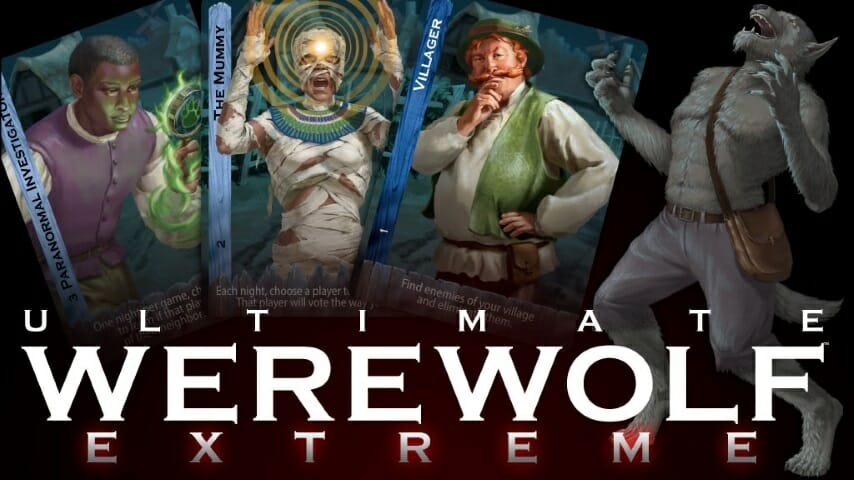
Designer Ted Alspach (The Castles of Mad King Ludwig, One Night Ultimate Werewolf) has a new game coming in October called Maglev Metro, a train game with playable maps of Berlin and Manhattan. The tiles are clear and stackable, so you can see all tracks even if they’ve covered by another player’s tiles. It’s a classic pickup-and-delivery game that can run 45-75 minutes depending on player count.
Whistle Mountain is a standalone sequel to Bézier’s hit 2018 game Whistle Stop, this time asking players to lay tiles with scaffolds and resources to build machines. Players build the board as they go, and the water line can rush up behind them making parts of the board unusable as the game progresses. There’s also a worker-placement element, and the game allows players to work up to combination moves that become very powerful, as in Whistle Stop.
Renegade
Succulent is a fun and attractive new tile-laying game where players place garden tiles on a central board to collect ‘cuttings’ in five different colors, trading them in for objective cards worth fixed point totals or variable ones based on other cards you have or where you placed your garden tiles. Players also have individual boards where they can collect water droplets, gained when you place your tiles on certain places or when another player places a tile adjacent to one of yours, later trading them in for cuttings they need to complete cards. It’s very fast-moving but encourages some long-term strategy. It’s out now.
The Search for Planet X is an app-driven deduction game that has a unique mechanic that allows you to tune the game’s difficulty level by player, so some players start with more clues than others do. You’re all astronomers trying to find out which sector of the sky has the mysterious Planet X, which you can do by collecting various logical statements about the locations of other celestial objects. You gain points by correctly guessing what is in each sector, with finding Planet X bringing the biggest reward. It’s out under the Foxtrot imprint and a reprint is on its way after the first printing sold out.
Renegade’s line of solo games continues this fall with Warp’s Edge, another title from Scott Almes (the Tiny Epic games’ designer). You’re a starfighter facing impossible odds, but your warp drive lets you re-fight a battle from different spots to try to survive, which you do by drawing tokens from a bag that gains some additional tokens in each round, similar to the way Coffee Roaster works.
Plan B Games
Alma Mater is from the designers of Egizia and 2018’s Coimbra, and is slightly heavier than those games although it’s a sort of spiritual successor to the latter. It’s an engine-building worker-placement game, as you’d expect from this design group (which calls itself Acchitocca), where players are headmasters of universities and compete to recruit better faculty and students and excel in the four main academic disciplines. Chris Qulliams’ art is outstanding and the parts (like tiny tomes) are really sharp.
There’s also an expansion coming for Matt Leacock’s Era: Medieval Age, his 2019 reboot of Roll Through the Ages, which will add rivers and roads to the three-dimensional board, as well as new buildings and scoring capabilities.
Plan B/Next Move will also release Beez, a new lightweight game of pattern-matching and nectar collection, in October, and have several other new releases and updates due later this year that won’t be announced until Essen.
Stronghold/Indie
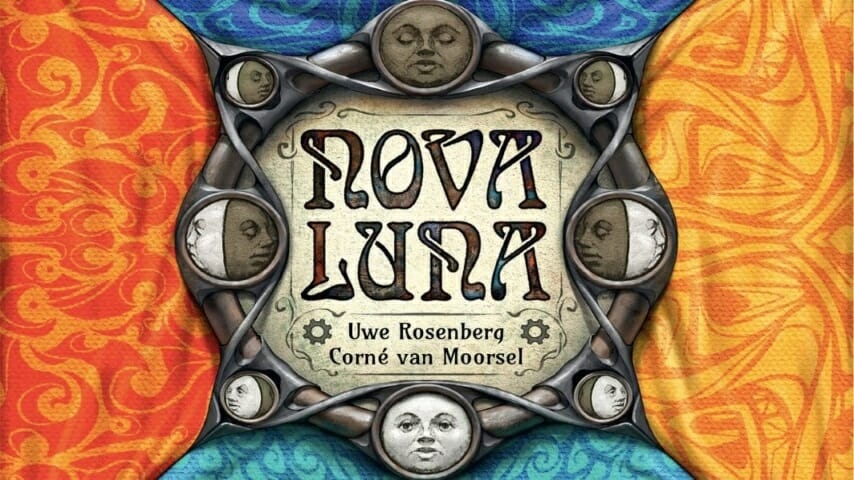
Nova Luna has actually been out since the start of 2020, but was one of the nominees for this year’s Spiel des Jahres. Nova Luna is Uwe Rosenberg’s update of the 2016 game Habitats, using an abstract theme and simplifying many of the rules while adding a time element. The first player to use all their scoring tokens in this tile-laying game is the winner.
Stronghold and Indie have made a name for themselves with light roll-and-write or flip-and-write games like That’s Pretty Clever! and Second Chance, and they introduced two more this year in a bundle they sold as part of Gen Con Online. Ripple Rush is one of the simplest games of the genre I’ve ever seen: you’re dealt a small deck of cards, at random, and must play them to fill out spaces on your scoresheet in the game’s four colors—but you have to be able to place each new number on your sheet in numerical order, or else you lose the ability to play that card and have to put it up for all other players to use. Divvy Dice goes the other way, with lots of dice-rolling as you try to fill out requirements on various cards, some of which have complex or specific demands, and then use your results to ‘buy’ new cards from the market.
That Gen Con bundle also included The Coldest Night, a cooperative game for up to four players who must add kindling cards to the communal fire to keep it burning without using them up so quickly that the growing cold puts it out; Crossed Words, a sort of Scattergories-style free-for-all with a 3×3 grid of categories where players try to come up with words that fit both vertically and horizontally; Scapegoat, a social deduction game where the traitor doesn’t know that they’re the traitor; and Magic Money, where you bid on magical creatures and can offer any amount of money in the world, but if you end up spending the most on your menagerie, you automatically lose. There are also new Aeon’s End expansions coming
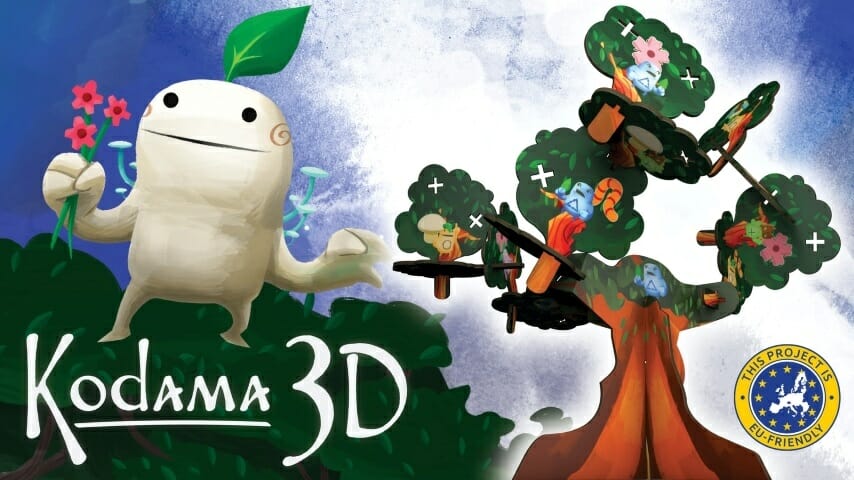
Kodama 3D brings back the great Kodama: The Tree Spirits in a new, updated format, building their trees not out of cards but out of interlocking cardboard pieces, so your trees do indeed extend out in three dimensions. You also have more choices of branches to take than in the original, although I think there’s a tradeoff here where 3D loses some of the original’s simplicity. Kodama Forest, a completely separate brand extension, is a semi-cooperative game where players work with their neighbors to place tiles on shared boards and try to cover up as many of the dirt spaces as possible.
I reviewed the first box of The Sherlock Files in May, and there are three more boxes, each with a trio of new cases, on the way, with box number two already out in that Gen Con bundle and the other two in the pipeline. There’s also a new Avalon title coming to Kickstarter, allowing for play with just four players, as well as new content, new roles, and updated art.
Stronghold has also delved into bringing back heavier games that have gone out of print, such as last year’s long-overdue reissue of Egizia (retitled Egizia: Shifting Sands), one of the greatest medium-heavy games ever made. This year’s big reprint is Tribune: Primus Inter Pares, now just called Tribune, a worker-placement and set-collection game where players compete to take control of various factions on the central board, with the first player to achieve the required amount of objectives the winner. It’s due out later this year.
Paper Plane Games
This brand-new boutique publisher has a new Uwe Rosenberg two-player game, Fairy Trails, a very lightweight game of pathbuilding and take-that moves that is already out to retail. The rules are very simple—all cards have purple and yellow paths on them, and on each turn you place a card from your hand on to the table to extend or end those paths. Once you’ve completed a path of your color at all ends, you can place a token on every open house space along that path. The first player to place all of their house tokens wins.
Story Machine
Those of you from the greater New York metro area probably have memories of nearly dying at Action Park. Story Machine has a game coming that might remind you of those escapades—Danger Park, a map-building game inspired by titles like Rollercoaster Tycoon, where you’re building rides at your amusement park, and can choose to make them more or less dangerous in a press-your-luck mechanic. Your ride can even make patrons sick, and they’ll vomit at the end of the round. Of course, you can always buy insurance policies too, so there might be some moral hazard at work in this game too. It’s out for pre-order now.
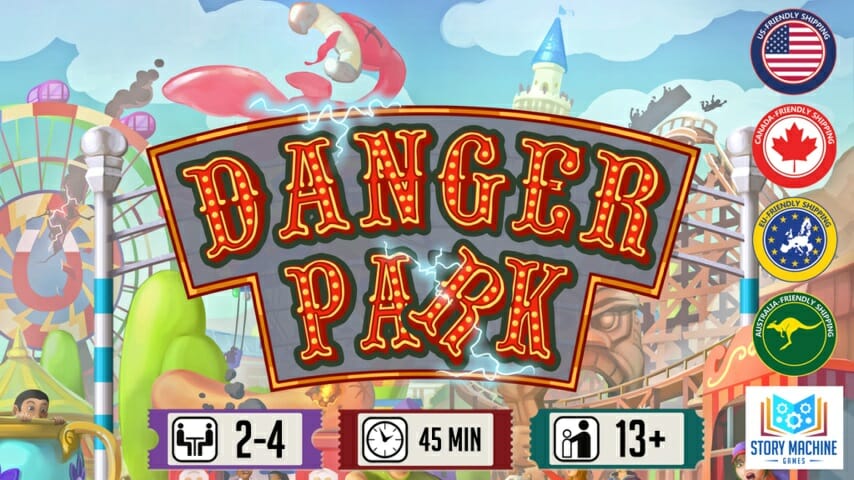
Quota is a deck-based party game that you play while doing something else with friends. Each player gets a card with two quotes on it, and must try to sneak one of the quotes on their card into casual conversation. If you slip it by everyone without another player calling you out for it, you get points and another card. It’s just $12 and has been out for a few months.
Rosetta: The Lost Language came out in June and is a cooperative puzzle game where one person plays the Author, assigning a meaning to an inscription in some meaningless symbols that also relates to a location image on a second card. The players will guess words, and the Author will draw them in this fictitious language to try to guide players to guessing the full meaning of the initial inscription. It’s out now for direct purchase and making its way to retail.
Space Cowboys
A Fistful of Daisies is a dueling game for two to four players as young as six from Space Cow, the brand’s imprint for kids’ games. Players roll dice and move their cows across the board, eating flowers if they land in unoccupied spaces, but if they land where there’s another cow, the two must “duel.” This title may not be out until early 2021, though.
The long-awaited Marvel Splendor game, which goes beyond retheming Splendor and adds multiple new mechanics, including Infinity Stones you have to acquire, will drop on October 23rd.
Z-Man
Pandemic: Hot Zone—North America is a slimmed-down version of the all-time classic cooperative game, taking just 30 minutes and coming in at $19.99, where 2 to 4 players work to eradicate a pandemic from North America. The box is smaller and the board is commensurately so, but the rules aren’t grossly simplified to make it a kid’s game—it’s just a shorter, more portable Pandemic.
Z-Man also just released its latest retheme of Love Letter, Infinity Gauntlet, to retail a few weeks earlier than planned. They announced that a new legacy title, Pandemic Legacy: Season 0, will be out by year-end; it’s a prequel to the two existing seasons of Pandemic Legacy and doesn’t require players to know or have played those two games.
Alderac

Mariposas, the eagerly anticipated followup to the Spiel des Jahres-winning game Wingspan from designer Elizabeth Hargrave, will be out in late August. It’s about butterflies. You’ll collect sets of cards and use them to migrate your butterflies across the board, reproducing when your tokens are near milkweed symbols, and have them return across the three seasons of the game, with scoring rounds after each. It’s due out at the end of August or early in September.
Pandasaurus
Pandasaurus’ Sonora is the first flick-and-write game and I reviewed it here last month.
Ctrl is a very tactile game where players stick little cubes of their own colors on a larger shared grey cube and try to get the top spots on that surface—but the game is scored from five different perspectives, with the winner the player who gets the most points in total across all five views.
Godspeed is a medium-weight worker placement game set on a distant exoplanet, bringing some shared decisions as well as an auction mechanism. There’s some point salad to the game as you can complete all kinds of objective cards, hit unique Civilization Milestones, or move up four different prestige tracks.
Pandasaurus is also bringing out a new edition of their 2007 game Tammany Hall, a game of player negotiations, alliances, and backstabbing that has been selling for over $100 on the secondary market since it went out of print. Their remaining Q2 schedule includes a stripped-down version of The Game called The Game: Quick & Easy; Robots, a 2020 Kinderspiel nominee; Gods Love Dinosaurs, a tile-drafting and area control game from the designer of Magic Maze; and Ohanami, a card-drafting game where you build Japanese gardens, receiving its first U.S. release.
Capstone
Capstone’s roster of games this fall is one of its best yet as the small publisher keeps expanding the type of games they publish. Ride the Rails is the second game in their Iron Rail series after last year’s Irish Gauge, another train game that combines pickup and delivery with stock purchasing, playing three to five players in under an hour.
New York Zoo is a new Uwe Rosenberg polyomino tile-laying game that draws from his own Patchwork and Cottage Garden as well as a bit from the Spiel-winning Zooloretto, as players either add tiles to build their animal enclosures or add animals to populate their zoos. Renature is a co-design by frequent collaborators Michael Kiesling and Wolfgang Kramer, where players place domino-like pieces on the central playing board to try to frame areas and score points for the plants contained within those spaces. Curious Cargo is a light two-player game from Ryan Courtney, the designer of the heavier-weight Pipeline, where players go against each other to build up their warehouses and coordinate the timing of trucks’ arrivals to ship and deliver your goods. All three should be out later this year, with some folks already reporting they’ve gotten Curious Cargo.
Stonemaier
Stonemaier’s newest game, Pendulum, went on sale for pre-orders earlier this month, but sold out almost immediately. There will be some copies at retailers, but the next print run for direct orders won’t come out until after the retail release. Stonemaier’s catalog includes many games from designer/owner Jamey Stegmaier (Scythe, Charterstone, Tapestry), but Pendulum is by new designer Travis Jones, and features timed play that limits your actions and makes time itself a resource as you build an engine to try to move your tokens up four separate victory tracks.
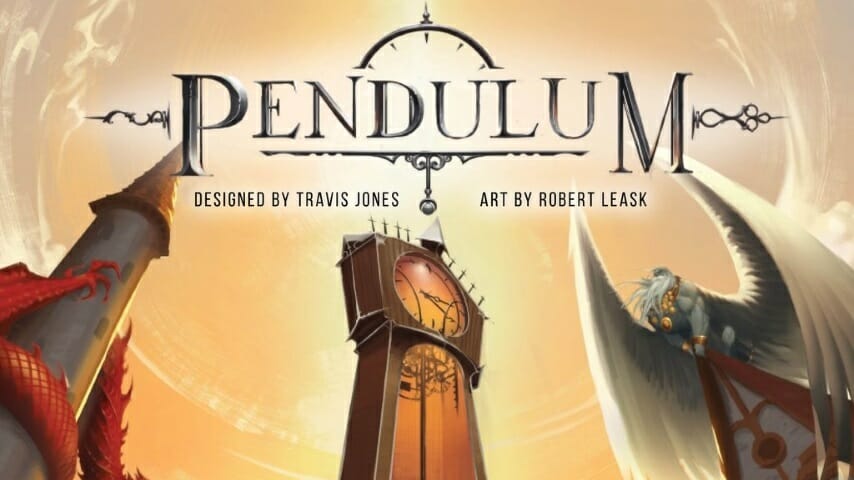
Board & Dice
B&D, publishers of acclaimed heavier games like Teotihuacan: City of Gods, previewed the next title from that designer, Daniele Tascini (who also created Tzolk’in: The Mayan Calendar). Tekhenu: Obelisk of the Sun is a lot of more of what you liked in those other two titles, with a similar theme, a novel mechanic for determining what actions you can use on which turns. It’s heavy and crunchy with lots of different places to put your pieces. It’s due out later this fall.
Traintopia is a much lighter, family-friendly game that has players building their own railroad tracks on tiles in their personal play areas, then scoring for those by placing specific meeple types on them, for the tracks’ length (as long as they’re completed at both ends) and by fulfilling objective cards that might, say, reward you for having no more than three tracks (completed or not). It’s out now.
Leder Games
Fort is the newest title from Leder Games, known for heavier titles like Root and Oath, but this time around they’re going family-friendly. Players compete to build the best fort, using toys and pizza to attract more (and, frankly, better) friends to your deck—but if you don’t make use of the friends in your hand on any turn, other players can steal them away. It’s lightweight with really fun art from Kyle Ferrin (who did the art for Root, Oath, and Vast) and plays in 20-40 minutes.
Deep Water Games
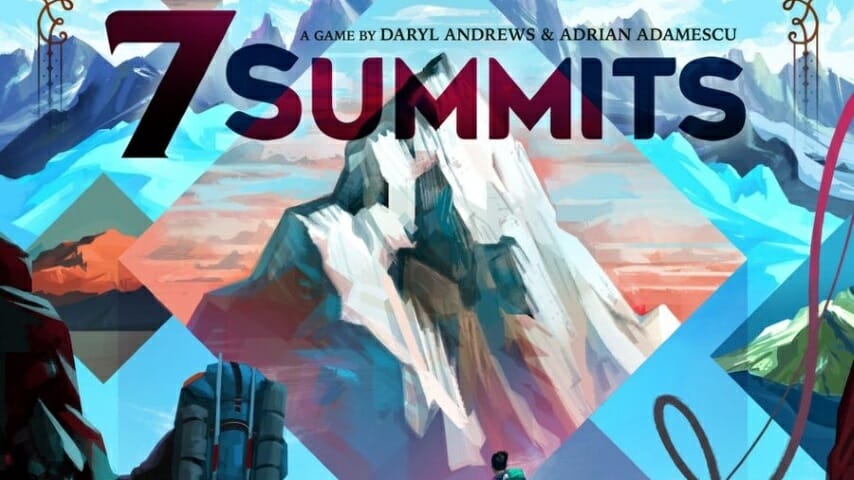
7 Summits is the next title from Daryl Andrews (Sagrada, Bosk), a game I demoed in prototype form last year at PAX Unplugged and really enjoyed. Players compete to scale seven mountains, the highest on each continent, by drafting dice rolled each round—six dice, with players having to choose to move one to Everest, the tallest and thus most difficult to ascend. It’s smart and quick-moving with plenty of thought required for each move.
Sovereign Skies just shipped to Kickstarter backers in the last week or so and should be out to retail soon. I’m a bit of a sucker for rondel games, from Glen More (an underappreciated classic where winning requires you to distill a lot of whiskey) to Vikings to Tzolk’in, and Sovereign Skies has that, promising a deep strategic experience in under an hour. Players compete for area control by choosing from six actions each round, moving workers around the rondel to vary the actions available, and try to gain the most influence points by game-end.
Keith Law is the author of The Inside Game and Smart Baseball and a senior baseball writer for The Athletic. You can find his personal blog the dish, covering games, literature, and more, at meadowparty.com/blog.